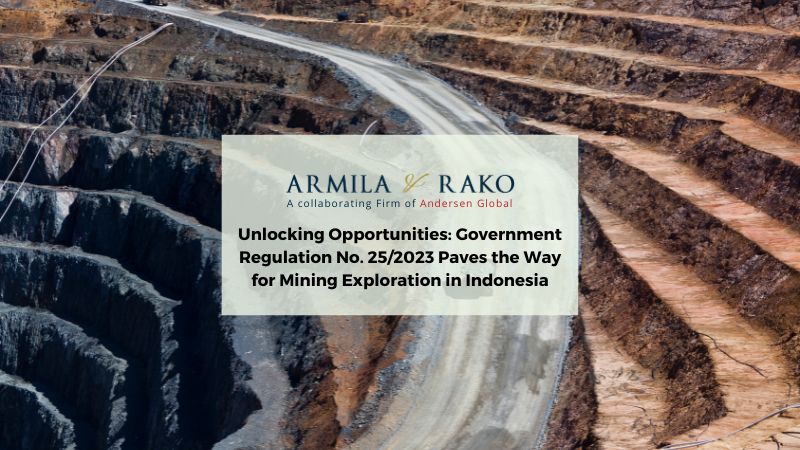Quick search
CTRL+K
Quick search
CTRL+K


Since 2010, the Global Law Experts annual awards have been celebrating excellence, innovation and performance across the legal communities from around the world.
posted 10 months ago
Introduction
The enactment of Government Regulation Number 25 of 2023 (“GR No. 25/2023”) marks a significant milestone in Indonesia’s mining industry. This regulation focuses on the determination of Mining Areas (“WP”), Mining Business Areas (“WUP”), Mining Business Area Permits (“WIUP”), Special Mining Business Area Permits (“WIUPK”), and the Investigative and Research assignment (“Assignment License”). In this article, we explore the key provisions of GR No. 25/2023 and their implications for the future of mining exploration in Indonesia.
Determination of WP, WUP, WIUP, and WIUPK
Under GR No. 25/2023, the Ministry of Energy and Mineral Resources (“MEMR”) is responsible for determining the Mining Areas (“WP”). However, the MEMR’s decision-making process is not independent. It requires initial approval from the governor and consultation with the House of Representatives [1] The WUP is established based on various factors, including carrier rock formations, data indications, resource data, and non-overlapping with other designated areas.[2] The delineation of WUP is carried out by the relevant governor and regent in consultation with the MEMR. The determination of WIUP for metallic minerals and coal is done by the MEMR,[3] while WIUP for non-metallic minerals and rocks requires a request from the business actor.[4]
The determination process for WIUPK follows a similar framework as WIUP for metallic minerals and coal, with additional requirements. These include adherence to prevailing regulations, resilience of reserves, national production capacity, and meeting domestic mineral needs.[5] GR No. 25/2023 aims to ensure consistency with the provisions outlined in Law Number 3 of 2020 (“Mining Law”) by expanding upon the references to WP, WUP, WIUP, and WIUPK determination.
Introducing the Assignment License
GR No. 25/2023 introduces the Assignment License as a key mechanism to gather crucial information on geologic conditions, data indications, resource potential, and mineral and coal reserves for the preparation for the tender of WIUP and WIUPK.[6] To encourage stakeholders to participate in obtaining their own WIUP or WIUPK, the regulation mandates the involvement of state-owned enterprises, regionally-owned enterprises, and private business entities in acquiring the Assignment License. State research institutions, state-owned enterprises, and regionally-owned enterprises may be allotted the Assignment License directly by the MEMR,[7] while private entities must apply to the MEMR for approval. All concerned parties must fulfill administrative, technical, and financial requirements.
Administrative, Technical, and Financial Requirements
The Assignment License application process is based on fulfilling administrative, technical, and financial requirements. The administrative requirement necessitates the inclusion of the business actor’s company profile and organizational structure.[8] The technical requirement involves showcasing prior experience in mining exploration activities, presenting a comprehensive plan for Assignment License activities over three years, and authorizing a team of mining exploration experts with at least three years of experience. The financial requirement entails submitting financial statements for the past three years. State or regionally-owned enterprises are also required to provide a declaratory letter from their banks, affirming the availability of funding for the Assignment License activities.[9]
Assignment License Holder’s Obligations
GR No. 25/2023 outlines several obligations for Assignment License holders. The regulation strictly prohibits the transfer of the assignment to another party, and any breach of this provision may result in revocation.[10] Moreover, if the Assignment License covers land bound by existing land rights, the license holder must obtain prior approval from the land rights holder. Furthermore, license holders must exercise great care and maintain confidentiality towards the received information before submitting it to the MEMR.[11]
The Right to Match
An interesting aspect of the Assignment License is the right to match granted during the tendering process for WIUP for metal minerals, WIUP for coal, and WIUPK for coal (if no state-owned or regionally-owned enterprise expresses interest in participating in the WIUPK offering). If an Assignment License holder is not awarded the tender, the winning party is required to reimburse the investment costs incurred by the Assignment License holder. The specific amount of reimbursement will be determined by the MEMR.[12]
Key Takeaways
To encourage exploration activities over the abundant mining areas in Indonesia, GR No. 25/2023 has succeeded in introducing several new concepts. Although it must be noted that some procedural provisions have not been regulated. Despite this, GR No. 25/2023 is appreciated for making one thing expressly clear: Indonesia is always ready to utilize the immense potential harbored by its mining areas to spearhead a prosperous future for its mining industry.
This article has been contributed by Steven Martin and Bondan Waskitajati Nugroho of Armila Rako, a corporate law firm based in Jakarta. The above article does not, and is not intended to, constitute legal advice; instead, this article is for general informational purposes only. Information contained in this article may not constitute the most up-to-date legal or other information. Should the readers have any inquiries, readers can contact the authors at [email protected] and [email protected] Any reliance on this article is at the user’s own risk.
[1] Article 14(1) of GR No. 25/2023
[2] Article 18(1) of GR No. 25/2023
[3] Article 21(2) of GR No. 25/2023
[4] Article 20(3) of GR No. 25/2023
[5] Article 46(1) of GR No. 25/2023
[6] Article 1(4) of GR No. 25/2023
[7] Article 22(2) of GR No. 25/2023
[8] Article 25(2) of GR No. 25/2023
[9] Article 25(4) of GR No. 25/2023
[10] Article 30(3)(b) of GR No. 25/2023
[11] Article 28(a) of GR No. 25/2023
[12] Article 31 of GR No. 25/2023
Author


There are no results matching your search.
Resetposted 20 hours ago
posted 2 days ago
posted 2 days ago
posted 3 days ago
posted 5 days ago
posted 1 week ago
There are no results matching your search.
ResetFind the right Legal Expert for your business
Sign up for the latest legal briefings and news within Global Law Experts’ community, as well as a whole host of features, editorial and conference updates direct to your email inbox.
Naturally you can unsubscribe at any time.
Global Law Experts is dedicated to providing exceptional legal services to clients around the world. With a vast network of highly skilled and experienced lawyers, we are committed to delivering innovative and tailored solutions to meet the diverse needs of our clients in various jurisdictions.